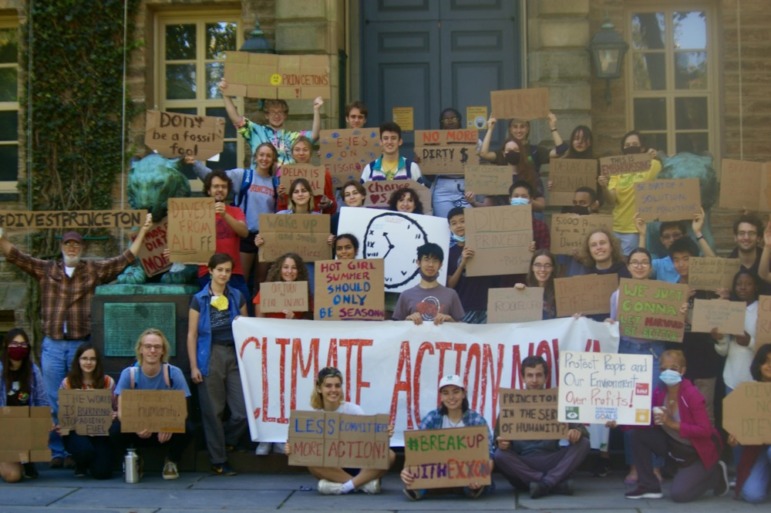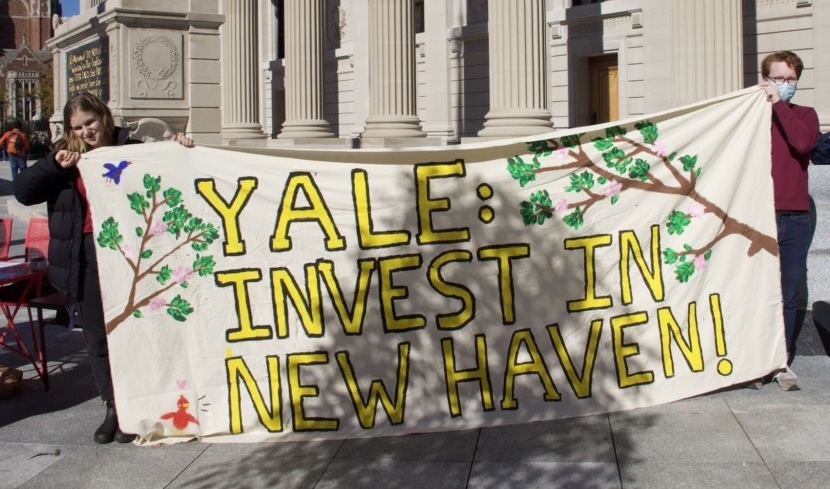For Molly Weiner, a 20-year-old sophomore at Yale University, pressuring the elite school to purge its $42 billion endowment of fossil fuel investments is a moral imperative, and one that appears to be gaining legal traction.
Although the university last year estimated just 2.6% of the endowment was invested in fossil fuels, that money is the “greatest lever I might have in my life” to affect change, said Weiner, an environmental studies major and organizer with the Yale Endowment Justice Coalition.

Tara Bhat courtesy of Molly Weiner
Molly Weiner, a 20-year-old sophomore at Yale University, is among those students pushing the school to divest from fossil fuels.
“Yale’s near $1 billion in the fossil fuel industry is more money than I would have access to in my own lifetime,” she said. “I see the push for divestment as one of the most impactful things I could be a part of, both because of the money that will be diverted from the industry, and the ripple effects divestment and our complaints may cause in the environmental and financial worlds.”
In February, Weiner’s coalition at Yale joined with students at the Massachusetts Institute of Technology, Stanford University, Princeton University, Vanderbilt University and lawyers at the Climate Defense Project to bring legal complaints against their schools’ respective investment funds.
The complaints were modeled on similar filings in recent years against Cornell University and Harvard University. Both schools made voluntary divestment pledges after the grievances were filed — timing activists took as a sign they had found a legal weakness in the schools’ armor.
Many schools have voluntarily announced climate commitments that include divesting from fossil fuels; student climate activists are hoping this legal strategy will prod holdouts along. And some see signs of progress.
Not long after the complaint was filed in New Jersey, Princeton University said it would eliminate its holdings in publicly traded fossil fuel companies, and the university’s board of trustees voted to disassociate the university from 90 companies involved in thermal coal or tar sands businesses.
“The Harvard decision put a lot of pressure on Princeton and its peers in the Ivy League and more broadly to divest,” said Hannah Reynolds, a recent Princeton graduate and who still works with Divest Princeton. “Young people who care about sustainability and social justice are deciding colleges based on whether the school has divested.”
Nonprofit schools have legal obligations
The divestment groups are asking attorneys general in their respective states to investigate continued investment in the fossil fuel sector by school trustees, alleging those investments violate the Uniform Prudent Management of Institutional Funds Act, which governs the use of money donated to charities.
Every state except Pennsylvania has a version of the law, which says universities, as nonprofits, must take into account their charitable purposes in a way that regular investors don’t have to.
Specifically, the student groups argue that damage to the environment and human health inflicted by the fossil fuel industry conflicts with the schools’ missions to care for their students and future generations.
Related Stories
• ‘Every day was a bad day’: Children working in agriculture aren’t protected equally
• For youth activists, historic climate law is only the beginning
• Electrical workers union trains Chicago youth for growing solar market
• After a win for U.S. climate change education, classroom implementation is off to a slow start
• Youth find hope restoring Rio Grande wetlands threatened by climate change
• Youth and climate change: How a generation is adapting while fighting for their future
They also argue that the long-term underperformance and volatility of oil and gas investments violate the duty of care under the act and say that there are potential conflicts of interest among school trustees and the fossil fuel industry.
Still, the complaints don’t have the same teeth as a lawsuit. It’s up to the attorneys general to take action.
In Connecticut, Yale students from Weiner’s coalition expect to meet with the attorney general’s office soon, said Alex Marquardt, executive director and managing attorney with the Climate Defense Project.
In Massachusetts, the attorney general’s office continues to work with students from Harvard, as well as now the Massachusetts Institute of Technology. The Massachusetts attorney general’s office confirmed it has met with complainants and is reviewing the complaint and considering additional briefing material.
A Harvard spokesperson declined to comment about whether student pressure from the filing with the Massachusetts attorney general contributed to the university’s decision to divest.
But Marquardt said the group hasn’t heard back from the attorneys general in California, New Jersey or Tennessee.
MIT spokeswoman Kimberly Allen told Youth Today that school leadership has explored the divestment question. The school has not made any formal commitments.
“We have begun a process of bringing our investment portfolio to net zero by 2050 to help bring MIT’s investments in line with our larger climate goals,” Allen said. “To that end, MIT’s Investment Management Company is currently engaged in an intensive analysis of how to achieve net-zero carbon in a broad and diversified investment portfolio such as ours.”
The attorneys general of Connecticut, Tennessee and New York did not respond to emailed questions. The attorney general of New Jersey declined to comment. Yale, Princeton, Stanford, Vanderbilt and Cornell did not respond to requests for comment.
Divestment surges, but oil and gas still hold power

Courtesy of Hannah Reynolds
A Divest Princeton rally outside Nassau Hall in fall 2022.
In 2012, Unity College, a small private college in New Gloucester, Maine, known for its emphasis on sustainability and environmental studies, became the first higher education institution in the United States to divest from fossil fuels.
In the years since, public and private institutions across the country have followed suit as climate activism became a rallying cry among young people. Schools and systems that have announced divestment commitments include the California State University System, George Washington University, Oxford University, Trinity College Cambridge and the University of Maine System.
Educational institutions now represent more than 15% of the 1,550 institutions around the world that have made fossil fuel divestment commitments, according to a database maintained by environmental advocacy organization Stand.
The divestment camp says that in addition to the damage they cause to the environment, oil, natural gas and coal companies aren’t a good long-term investment as the world transitions away from fossil fuels. Despite recent gains, oil and gas investments are among Wall Street’s worst performing over the last decade.
Still, in the short-term, global oil and natural gas companies have reaped a windfall from rising prices due to post-pandemic demand and the war in Ukraine. And at many schools, deep-pocketed fossil fuel interests provide scholarships, facilities and money for research and development. Indeed, oil and gas revenues helped the University of Texas System’s endowment – which not only owns stocks but also oil and gas-producing land – surpass Yale’s in size last year and puts it on course to challenge Harvard’s this year.
Karly Matthews, communications director with the American Conservation Coalition, a conservative group that mobilizes young people around environmental action, points out that many students come from communities that benefit from fossil fuel companies.
“I have a friend who was able to go to college because of a scholarship the coal lobby provided,” she said.
Students in fossil fuel-rich states or those who are pursuing degrees in those industries are less likely to support divestment. For example, students from the Colorado School of Mines, which has a leading petroleum engineering program, form the biggest chapter of the Colorado Federation of College Republicans, said chairman Patrick Warnaka.
Divestment “puts their future directly in peril,” he said.
Despite this tension, conservative students who oppose divestment have not formed their own organized movement to counter the climate activists, Warnaka and Matthews said.
Challenges to divestment
While their conservative peers tend to ignore them, college environmental activists favoring divestment say they have faced resistance from other power centers.
“The majority of pushback we have faced has been from administrators who don’t want to seem as though they are having their hand forced by student activists and from alumni who work in the oil and gas industry,” said Reynolds, the Divest Princeton organizer.
Resistance to divestment has also been coming from politicians, with a push against the movement in the major fossil fuel strongholds of Texas, Louisiana, Oklahoma and West Virginia, as well as other states. Texas passed a law last year barring state pension funds from holding stock in financial services firms that boycott fossil-fuel companies.
Marquardt, the Climate Defense Project attorney, said he doesn’t think the Texas law would apply to university endowment funds used by schools for operating expenses and scholarships.
Despite the backlash from some corners, student activists continue their moral and legal push for full divestment of oil, gas and coal holdings. They’re also going further and agitating for their schools to not accept fossil fuel money for research.
“Divest Princeton will keep fighting for our goals of full divestment and the end to all fossil fuel funding of research on campus,” Princeton student climate activist Nate Howard said in a statement following his schools’ divestment announcement. “We know that it’s possible: We’ve come this far.”
***
Matt Whittaker is a Colorado-based journalist who writes about energy, extractive industries, agriculture, water and the roles natural resources play in human conflict.




























